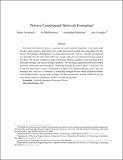Privacy-constrained network formation
Author(s)
Acemoglu, K. Daron; Makhdoumi Kakhaki, Ali; Malekian, Azarakhsh; Ozdaglar, Asuman E
DownloadAccepted version (685.9Kb)
Terms of use
Metadata
Show full item recordAbstract
We study the effects of privacy concerns on social network formation. Each individual decides which others to form links with. Links bring direct benefits from friendship but also lead to the sharing of information via a percolation process. Privacy concerns are modeled as a disutility that the individual suffers as a result of her private information being acquired by others. We specify conditions under which pure-strategy equilibria exist and characterize both pure-strategy and mixed-strategy equilibria. The resulting equilibrium networks feature clustered connections and homophily. Clustering emerges because if player a is friend with b and b is friend with c, then a's information is likely to be shared indirectly with c anyway, making it less costly for a to befriend c. Homophily emerges because small additional benefits of friendship within a group make linkages and thus information sharing within that group more likely, further increasing the likelihood within-group links. Keywords: Network formation; Networks; Privacy
Date issued
2017-08Department
Massachusetts Institute of Technology. Department of Economics; Massachusetts Institute of Technology. Department of Electrical Engineering and Computer ScienceJournal
Games and Economic Behavior
Publisher
Elsevier BV
Citation
Acemoglu, Daron et al. "Privacy-constrained network formation." Games and Economic Behavior 105 (September 2017): 255-275 © 2017 Elsevier.
Version: Author's final manuscript
ISSN
0899-8256